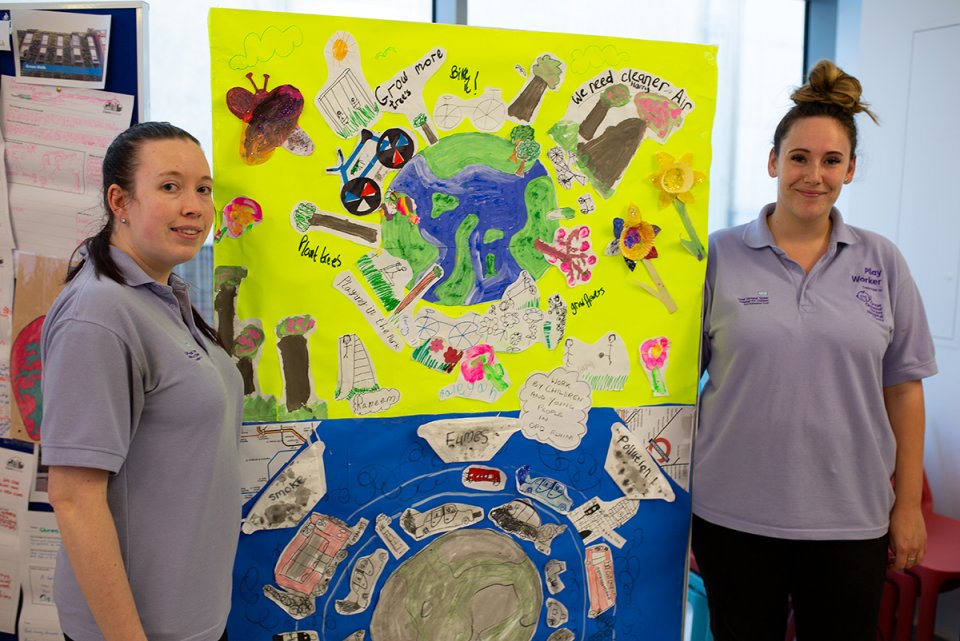Dr Penny Woods, Chief Executive of the British Lung Foundation, writes a guest blog for Global Action Plan about the impacts of air pollution on our lungs and the need for Clean Air Day.
Many people worry about the impact air pollution is having on the environment. It’s not just the future of the planet that’s at risk, air pollution is an invisible danger, causing terrible damage to everyone’s lung health.
Poor air quality contributes to the equivalent of 40,000 early deaths a year across the UK. That’s why the British Lung Foundation and our Breathe Easy groups are passionately supporting Clean Air Day.
Air pollution can get deep into your lungs, making you feel out of breath, irritating the airways, and increasing the chances of developing lung disease. Some research has shown that tiny pollution particles can even pass through your lungs into your bloodstream, meaning air pollution could be linked to many other health problems too.
Over short periods, exposure to high levels of pollution can cause irreparable damage to the lining of our lungs. This can lead to coughing, wheeziness, and/or breathlessness, particularly among people with a pre-existing lung condition. Long-term exposure increases the risk of getting lung cancer and cardiovascular disease.
It’s clear - we’re all at risk from dirty air. The most vulnerable are hit hardest, this means people with a lung condition, the elderly, and children.
Children's lungs are still growing and air pollution can stunt that growth. Evidence has shown that children growing up in polluted areas are four times more likely to have poor lung growth. Children with smaller lungs could have health problems later in life: pollution is bad for children.
Healthy people who work or exercise outdoors could also experience symptoms, such as feeling out of breath or coughing.
Clean Air Day coincides with our own Breathe Easy Week (12-16 June). Breathe Easy support groups, all over the UK, will be showcasing the range of activities they do. Many will be using Global Action Plan’s resources to raise awareness of poor air quality in their local town or city. They’ll be supporting the British Lung Foundation’s call for a new, fair and ambitious Clean Air Act.
These groups provide free support for anybody affected by any lung condition – from lung cancer and chronic obstructive pulmonary disease (COPD) to rarer conditions such as idiopathic pulmonary fibrosis (IPF) and mesothelioma. Breathe Easy groups also organise events, campaign on key issues, and feature regular guest speakers at meetings.
We have to keep reminding the government, and the new metro mayors, that air pollution remains a public health crisis. Clean Air Day is giving our Breathe Easy groups the means to do this.
We all have a right to breathe clean air with healthy lungs.
WHAT TO DO WHEN AIR POLLUTION LEVELS ARE HIGH
- Reduce or avoid strenuous, outdoor exercise. The benefits of exercise are great if you have a lung condition, so make sure you exercise indoors in a well-ventilated room or gym instead.
- Stay away from high pollution areas, such as main roads and road junctions.
- Try to get to work a little earlier, before rush hour traffic and pollution have built up.
- If you cycle, run or walk, take back streets routes, away from the bulk of vehicle congestion.
- If you use a reliever inhaler, make sure it’s with you.
- If you have asthma, use your preventer inhaler regularly.
- If in a vehicle, keep the windows closed and recycle air.
- If you find your condition is getting worse, or if you are getting wheezy or coughing from walking outside, get in touch with your doctor.
For more information or advice visit www.blf.org.uk
